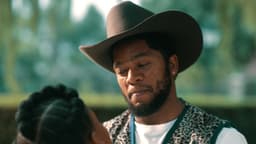
How Perry Mason fights the system
PI turned lawyer Perry Mason (Matthew Rhys) is back fighting the system in 1930s Los Angeles. Throughout the season we’ll see him struggling with his doubts as he drops criminal law in favour of civil law, hoping for less conflict. Instead he’ll find that the law is set up to favour the rich and powerful over the poor, no matter how you slice it.
Perry Mason Season 2 is set in 1933, the year that Hitler became a German chancellor. In the US, it’s the midst of the Great Depression, and as working people fight tooth and nail for survival, legal and social divides become hurdles for everyone who’s on the “wrong” side of gender, racial, financial and cultural divides.
But the unequal system that’s weighing Perry down comes as no surprise to Perry’s co-council and legal secretary, Della Street (Juliet Rylance) – a single, lesbian woman – and his lead investigator, cop-turned-PI Paul Drake (Chris Chalk), a married Black man. They’re used to having to tread carefully to avoid the cracks.
Della

Della came from a wealthy background but was disinherited when she ran away from home at the age of 25 to avoid an arranged marriage. She now lives at a boarding house and in Season 1 we saw her negotiating a romantic relationship with a fellow boarder, Hazel (Molly Ephraim). The boarding house is a necessity, because at this time, no bank will allow Della, Hazel, or any other woman, to open a credit account or take out a mortgage without having a man to co-sign it for her.
This season, Della is studying for her bar exam so that she can become recognised as Perry’s official partner in the firm – a job she’s already pulling most of the weight on. She’s the one finding clients and preparing briefs, researching the law, meeting plaintiffs and preparing arguments. In episode 6 we even see her step up in court to shout “objection” when Perry’s attention wanders and some disrespectful questioning crosses the line.
While Della is a forceful personality at work, she’s living a significant part of her life in fear. In Della’s time, even wearing gender non-confoming clothes is against the law. And lesbianism is seen not just as a mental illness, but a sign of moral depravity. It’s a ticking bomb in her career, and one that an opponent can find out at any time, then keep in their back pocket to completely discredit her professionally when the moment is ripe.
If Della is taken to a mental hospital as treatment for being a lesbian, under California’s Asexualisation Act, they can and will sterilise her without her consent for “marked departure from normal mentality”.
But temptation comes Della’s way this season when she meets Anita St Pierre (Jen Tullock), a writer who’s partly based on Hollywood screenwriter Anita Loos (Gentlemen Prefer Blondes). In episode 4 we’ll see what it’s like for Della to really let her hair down, when she visits Anita’s hideaway in Palm Springs – where they don’t have to be on the lookout for snoops … you know, private investigators like the ones Della’s firm hires. And in episode 8 we’ll see how Della and District Attorney Ham Burger (Justin Kirk), who’s also in the closet, find a workaround to protect their reputations.
Paul

Like Della, Paul faces real restrictions to where he lives and buys a home. At this time the Federal Housing Administration is handing out loans to developers to build homes … on condition that they don’t build new houses in or near Black neighbourhoods – because they’re certain this will devalue the properties, putting their loans at risk.
Last season, Paul had a daily fight on his hands as a Black police officer in the LAPD, where he was subjected to ongoing racist abuse, barred from promotion, and not ever allowed to put handcuffs on white suspects. He brought in potentially case-solving evidence, but was forced to change his reports by corrupt superiors. In the Season 1 finale, though, he put his gun, badge and bribe money on his boss’s desk and went to work with Perry.
Paul is still a man at odds with his community, and his boss, when he uncovers evidence that seems to undermine Perry’s big case in Season 2, only to have Della immediately hide it! Paul’s also in a dangerous position as a Black man poking his nose in here, there and everywhere. Without a police uniform, looking means lurking and loitering, and evidence gathering looks like theft. And the more Paul sees how much damage the law does in his community – particularly when evidence he’s gathered is used to imprison a gangster who was doing more good than harm – the more he’s going to redraw his own borders between what’s legal, and what’s moral.
Both at home and at work, we’ll see Paul having to police what he says, guard his tone, and watch his step. It’s exhausting! With Paul getting less work as Perry moves into civil cases, he’s getting attitude from his brother-in-law Mo (Jon Chaffin), who’s now pulling the weight for the family financially. Mo, a manual labourer, sees himself as more manly than Paul.
Watch the trailer for Perry Mason Season 2
Clara
There’s one person fighting in Paul’s corner, though – his wife Clara (Diarra Kilpatrick).
As a Black woman, Clara lives a doubly restricted life, dealing with every prejudice and law that works against him, as well as all the legal restrictions against her as a woman.
Clara’s career options are extremely limited during the Great Depression. She’s competing for any job with white working class women, who’re desperate to find jobs to make up for their men being laid off. When the government gets the men back to work on construction projects and public works, Black men are at the back of the queue, while Black women won’t even get a look in at all. As a result, women like Clara struggle to find work outside of jobs as house cleaners and child minders. And within domestic work, employers can pay her whatever they want and dock her pay as they please without any legal consequences. Unless you’re an entertainer or an entrepreneur within the Black community, that’s your lot.
But Clara believes in the man Paul wants to be. She urges him to fight for what’s right, not what the law says. And when he comes up against a wall, she’ll help him to break through it. In Season 2, episode 7, we’ll see how Clara makes the public's assumptions about Black women work in her favour. When Paul knows that he’ll never get through the door in a house in a “good” neighbourhood, Clara knows a string to pull. Dress modestly, claim to be collecting charity for a church, and nobody’s going to blink twice.
It’s a small victory worth celebrating as the two share their nightly dance at home together.
Separate and unequal

Curious about what else the law had to say? At this point in the United States (as we’ll see in Season 2’s court cases), the legal system didn’t even see women as credible jurors or witnesses, let alone respecting them as lawyers, while Black witnesses were not allowed to testify against white defendants in court.
In 1932, the US government fired one member of each married couple who both worked government jobs as a measure to save jobs for men during the Great Depression. And in 1933, if you were looking for work, employers had the legal right to refuse to employ people along sex, religion, and colour lines. They were entitled to pay one group more than another for the same work. And they were allowed to fire or refuse to employ mothers of babies and children who were under school age. Labour laws further restricted women’s working hours, and completely barred them for certain industries, reserving higher paying fields for men.
And public facilities paid for out of everyone’s taxes, like swimming pools and schools, were also restricted by race. One California neighbourhood even had one day a week for Black swimmers, after which they drained the pool, and refilled it for white patrons the next day!
More like this

Jojo on The Real Housewives Ultimate Girls Trip: Africa reunion, social media backlash and more
Jojo opens up about the highly anticipated reunion for The Real Housewives Ultimate Girls Trip: Africa, coming to Showmax on 20 and 27 February.

South Africa’s stories and storytellers recognised as SAFTA nominees announced
Mzansi’s boldest stories take centre stage as the 2026 SAFTA nominees are unveiled, with a wave of nominations across DStv and Showmax.

The ‘Burbs S1
In this adaptation of the 1980s Tom Hanks dark comedy, a couple moves back to the husband's hometown, only to face a cul-de-sac shrouded in mystery.

“You don't create something so powerful purely through military tactics” - Shaka iLembe co-creator
Shaka iLembe co-creator Desireé Markgraaff reflects on the vision, research, and importance of telling our stories. Stream Seasons 1–2 on Showmax.

Where to see the cast of Shaka iLembe S1-2 on Showmax
From Nomzamo Mbatha as Queen Nandi to Lemogang Tsipa as King Shaka Zulu and Thembinkosi Mthembu as King Dingiswayo, see the cast of Shaka iLembe in some of their other acclaimed roles on Showmax. Binge now on Showmax.

MaBlerh to host the first-ever The Real Housewives Ultimate Girls Trip: Africa reunion
MaBlerh will host the first-ever reunion for The Real Housewives Ultimate Girls Trip: Africa, set to air in two parts in February 2026.

Shaka iLembe S1-2
Set in the 1700s, Shaka iLembe tells the story of the making of the iconic African king. All episodes are now available to binge.

Six Taylor Sheridan series while we wait for The Madison
Excited about The Madison coming in April? We’ve rounded up all the Taylor Sheridan series you can watch on Showmax while we wait.
Outlaws, now streaming on Showmax
Go on holiday with RHUGT: Africa
The most binge-worthy series to stream

Jojo on The Real Housewives Ultimate Girls Trip: Africa reunion, social media backlash and more
Jojo opens up about the highly anticipated reunion for The Real Housewives Ultimate Girls Trip: Africa, coming to Showmax on 20 and 27 February.

South Africa’s stories and storytellers recognised as SAFTA nominees announced
Mzansi’s boldest stories take centre stage as the 2026 SAFTA nominees are unveiled, with a wave of nominations across DStv and Showmax.

Billy Joel: And So It Goes (2025)
An honest, insightful, and deeply moving look at the life and career of acclaimed musician Billy Joel, covering both his struggles and triumphs.

Surviving Mormonism with Heather Gay S1
Former RHOSLC cast member Heather Gay investigates hidden truths within the Mormon church, exposing cracks in its perfect facade.
Latest Stories

Schalk Bezuidenhout trades stand-up for 9-5 in Die Kantoor

A heartbreaking loss: Nolwandle Biyela’s final stand in Outlaws Season 2

Fall in love with romantic drama Touch, now on Showmax

Antonie Marx on Volspoed and why it's a must-watch

Sandra Stein makes her debut on Law, Love and Betrayal S2

Albert Pretorius on Die Kantoor, SA’s re-imagining of The Office

20+ addictive South African reality shows to stream

Where to watch The Real Housewives franchise online

How to Train Your Dragon: Bringing Hiccup and Astrid to life

What to watch on Showmax in January 2026

7 things to know about indie award-winning movie Dìdi

Mission: Impossible – The Final Reckoning’s South African stunts

Die Kwiksilwers (2024)

Where to see the cast of Mpondoland on Showmax

Angel on The Real Housewives Ultimate Girls Trip, Jojo and more

Thandolwethu Zondi on his new role in Outlaws S2
Must-watch trailer for Showmax's turbo-charged reality series Volspoed

The Real Housewives Ultimate Girls Trip cast on first impressions, beefs and more

Fana Mokoena on playing a sangoma in Masinga

Princess Jecoco on The Real Housewives Ultimate Girls Trip Africa

Tlali returns: Outlaws’ most loved and hated villain is back

Novocaine: the US box office hit shot in Cape Town

Why Jackie Phamotse says Slay Queens is a must-watch

Evodia on Ultimate Girls Trip Africa and her return to reality TV







